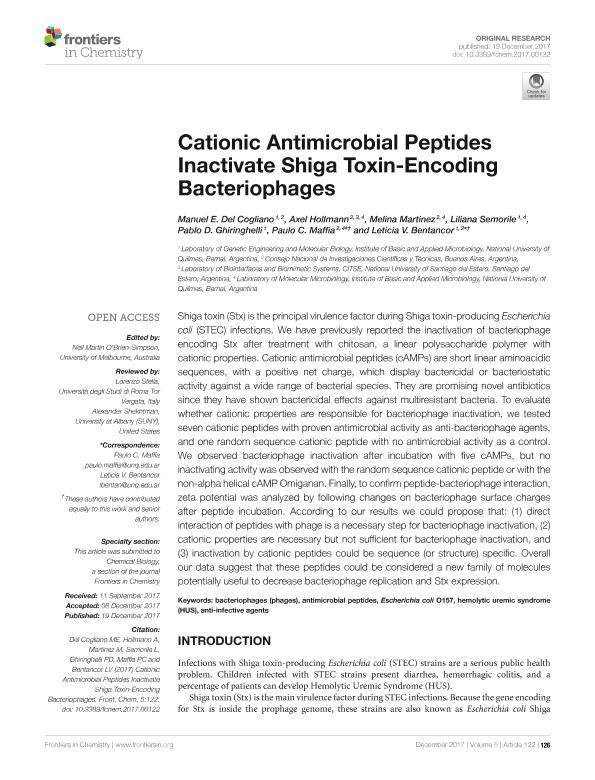Capítulo de Libro
Cationic antimicrobial peptides inactivate shiga toxin-encoding bacteriophages
Título del libro: Antimicrobial and anticancer peptides
del Cogliano, Manuel Eugenio ; Hollmann, Axel
; Hollmann, Axel ; Martínez, Melina María Belén
; Martínez, Melina María Belén ; Semorile, Liliana Carmen; Ghiringhelli, Pablo Daniel
; Semorile, Liliana Carmen; Ghiringhelli, Pablo Daniel ; Maffia, Paulo Cesar
; Maffia, Paulo Cesar ; Bentancor, Leticia Verónica
; Bentancor, Leticia Verónica
 ; Hollmann, Axel
; Hollmann, Axel ; Martínez, Melina María Belén
; Martínez, Melina María Belén ; Semorile, Liliana Carmen; Ghiringhelli, Pablo Daniel
; Semorile, Liliana Carmen; Ghiringhelli, Pablo Daniel ; Maffia, Paulo Cesar
; Maffia, Paulo Cesar ; Bentancor, Leticia Verónica
; Bentancor, Leticia Verónica
Fecha de publicación:
2018
Editorial:
Frontiers Media S.A.
ISBN:
978-2-88945-470-9
Idioma:
Inglés
Clasificación temática:
Resumen
Shiga toxin (Stx) is the principal virulence factor during Shiga toxin-producing Escherichia coli (STEC) infections. We have previously reported the inactivation of bacteriophage encoding Stx after treatment with chitosan, a linear polysaccharide polymer with cationic properties. Cationic antimicrobial peptides (cAMPs) are short linear aminoacidic sequences, with a positive net charge, which display bactericidal or bacteriostatic activity against a wide range of bacterial species. They are promising novel antibiotics since they have shown bactericidal effects against multiresistant bacteria. To evaluate whether cationic properties are responsible for bacteriophage inactivation, we tested seven cationic peptides with proven antimicrobial activity as anti-bacteriophage agents, and one random sequence cationic peptide with no antimicrobial activity as a control. We observed bacteriophage inactivation after incubation with five cAMPs, but no inactivating activity was observed with the random sequence cationic peptide or with the non-alpha helical cAMP Omiganan. Finally, to confirm peptide-bacteriophage interaction, zeta potential was analyzed by following changes on bacteriophage surface charges after peptide incubation. According to our results we could propose that: (1) direct interaction of peptides with phage is a necessary step for bacteriophage inactivation, (2) cationic properties are necessary but not sufficient for bacteriophage inactivation, and (3) inactivation by cationic peptides could be sequence (or structure) specific. Overall our data suggest that these peptides could be considered a new family of molecules potentially useful to decrease bacteriophage replication and Stx expression.
Palabras clave:
Synthetic peptides
,
Antimicrobial peptides
Archivos asociados
Licencia
Identificadores
Colecciones
Capítulos de libros(SEDE CENTRAL)
Capítulos de libros de SEDE CENTRAL
Capítulos de libros de SEDE CENTRAL
Citación
del Cogliano, Manuel Eugenio; Hollmann, Axel; Martínez, Melina María Belén; Semorile, Liliana Carmen; Ghiringhelli, Pablo Daniel; et al.; Cationic antimicrobial peptides inactivate shiga toxin-encoding bacteriophages; Frontiers Media S.A.; 2018; 126-131
Compartir
Altmétricas



